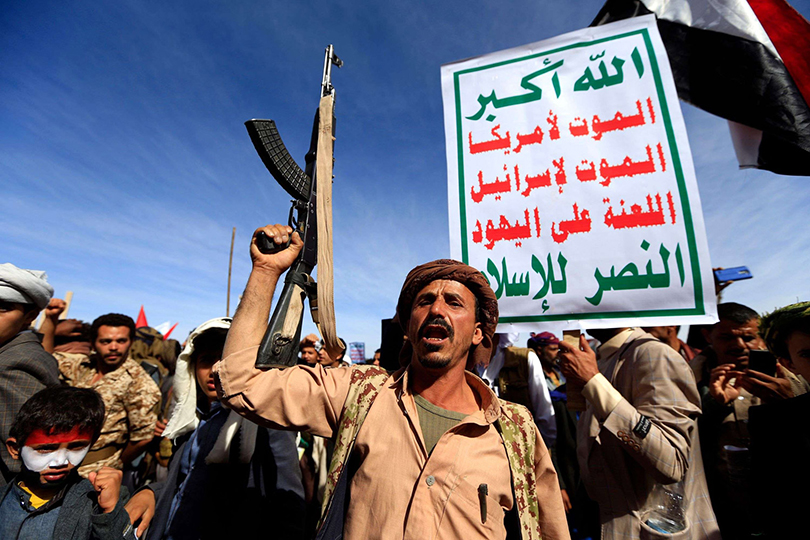Kristin Diwan | Senior resident scholar at the Arab Gulf States Institute in Washington, D.C.
For the Trump administration, Yemen has been viewed through the lens of Iran policy, and thus primarily as a front for countering Iranian expansionism. News of the exploration of talks with the Houthi movement is therefore a clear indication of a retreat in the maximum pressure campaign against the Islamic Republic. U.S. engagement with the Houthis, who have crudely but effectively been launching drones and lobbing missiles at Saudi civilian targets, suggests an attempt to decouple the militia from its Iranian enablers, thus depriving Iran of one front for sabotaging Washington’s partners. In an ironic reversal, U.S. maximum pressure may bring the Americans to the negotiating table.
Success in those negotiations would require Washington to expand its Yemen vision beyond the narrow Iran aperture. But a fuller picture will reveal a landscape inauspicious for a bargain, or at least one that will meet the original Saudi war aims of restoring the legitimate government of President ‘Abed Rabbo Mansour Hadi and the U.S. commitment to preserve a unified Yemen. As a recent report by the International Crisis Group noted, resolution of the Yemen crisis will require a recognition of stakeholders to reflect current realities, a reality that shows gains by the Houthis and southern separatists.
Mustapha Noman | Former Yemeni deputy foreign minister and diplomat
The news of potential backchannel talks between representatives of the U.S. government and Ansar Allah, the Houthi movement, comes very late. However, better late than never. I have always advocated a dialogue between regional representatives and the Houthis as they are controlling the geographical areas adjacent to the Saudi borders, control over which was one of the major goals of the Decisive Storm military campaign launched in March 2015.
It seems to me that the Saudi government is reluctant to initiate a new dialogue with Ansar Allah after the collapse of the arrangements agreed in Dhahran al-Janoub in March 2016. These preceded negotiations in Kuwait in April of that year between the Houthis and the Saudi-backed government of President ‘Abed Rabbo Mansour Hadi. Now that the U.S. government may be willing to engage in talks with Ansar Allah, it will certainly be in close consultations with Riyadh. If there is any positive outcome from such talks, this will make it politically easier to open multiparty talks that include Saudi Arabia and the United Arab Emirates.
Rafat Ali al-Akhali | Former Yemeni minister, fellow of practice—strategic projects at the Blavatnik School of Government at the University of Oxford
Previous U.S. ambassadors to Yemen, including Gerald Feierstein and Matthew Tueller, had multiple meetings with the Houthis in San‘a up to 2014, and in Muscat, Oman, since then. Even former U.S. secretary of state John Kerry met with the Houthis in Muscat in 2016. Therefore, the key issue is not whether the United States will begin backchannel talks with the Houthis, but rather whether the Trump administration is, first, convinced that it is time for a serious push to bring the conflict in Yemen to an end; and second, whether it has a clear peace plan with which Saudi Arabia and the United Arab Emirates would be on board. Once all these ingredients are in place, direct or backchannel talks with both the Houthis and with the government of Yemen can easily progress.
Eleonora Ardemagni | Associate research fellow at the Italian Institute for International Political Studies, author of the monograph “The Huthis: Adaptable Players in Yemen’s Multiple Geographies,” (CRiSSMA, Catholic University of Milan, 2019).
It’s more likely now than before. The United States, the Houthis, and most of all Saudi Arabia have to gain from deescalation talks. However, Riyadh can’t begin this with the Houthis’ daily launch of missiles against Saudi civilian targets and the domestic patriotic narrative of the war in Saudi Arabia. However, the Saudis need to stabilize their southern border, especially since a Pandora’s Box has been opened in the south of Yemen.
The time seems ripe for Washington to explore such a path, as this could be its last chance to break the process through which the Houthis are becoming proxies of Iran (they just appointed an “ambassador” in Tehran), while also working to secure the freedom of commercial maritime transit in the southern Red Sea. Although “Death to America” is chanted by the Houthis, they are an adaptable movement divided between pragmatists in San‘a and hardiners in Sa‘da. The United States should seek to exploit that rift. The Houthis aim to consolidate governance in Yemen’s north and Washington’s outreach would look like an implicit recognition of their role.







Comments